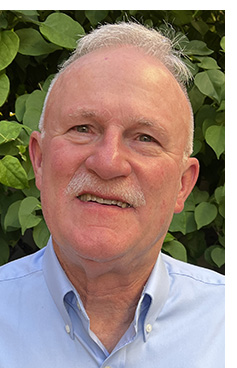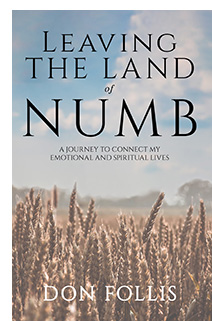
Veteran Christian minister and campus pastor Don Follis recently wrote a memoir emphasizing the importance of ministry leaders connecting their emotional and spiritual lives. In this essay, he shares some of his story.
_ _ _
By Don Follis
Twenty-five years ago, I finally left the Land of Numb—the land where I was raised. The ruts run deep to that land, and I still know the way back. From time to time, I return there. Most days, though, I can barely see it in my rearview mirror.
When I was a boy in the town of Colby in northwestern Kansas, out on the rural High Plains, I lived smack dab in the middle of the Land of Numb, but I didn’t even know it. What I did know was that everyone there was just fine—families, merchants, pastors, dogs, cats—everyone and everything. I knew the everyday utterances of that land:
“I’m just fine.”
“It’s just one of those things.”
“Just work harder.”
“A lot of people have it worse off than you do.”
“You’re just going to have to get over it.”
People crossed their arms when they said those lines. And you’d better believe my arms were crossed and I was just fine. Though I was a sensitive redheaded boy, I dried up those tears because big boys don’t cry. No one taught me any of those lines, because they can’t be taught—they are caught.
After high school, I left Colby and the High Plains, but it took a long time to leave the emotional Land of Numb. I lived there well into adulthood and 20 years into my ministry career. But for the last 25 years I have worked hard to stay out of the Land of Numb; I’ve done my best to be fully present and feel the full weight of painful and positive emotions. My emotional life and my spiritual life are way more connected than I ever imagined when I was growing up.
LEARNING FROM MY WIFE
After my wife, Jennifer, and I were married at Central Christian Church in Mesa, Ariz., in July 1978, we headed off to do campus ministry at the University of Illinois. I didn’t realize I had married a woman who despised the Land of Numb. I am so fortunate. From the day we met, she could name her emotions almost instantly. She still can. Not me. I still carry around a list of 500 emotions in my journal that I consult from time to time.
Living in the Land of Numb took a huge blow in the early 1990s when one Saturday my 4-year-old daughter cracked her elbow and ended up in the emergency room. She was OK, but it turned into a several-hour ordeal. When we finally returned home and put our child to bed, Jennifer and I walked into the living room and fell onto the couch exhausted.
“How do you feel?” she asked.
“Just fine.”
Kaboom! Jennifer smacked the coffee table with her hand. “Mister,” she said, “you cannot be fine. Fine is a grade of sandpaper. You can be scared, relieved, or grateful, but you cannot be fine.”
She took a big breath and said, more calmly, “Would you like a do-over?”
“Yes, please,” I said. “I am very relieved, grateful, and thankful that she is going to be OK.”
Jennifer stood up, kissed me on the forehead, and said, “Me, too. Let’s go to bed.”
LEARNING FROM THE INCARCERATED
A second blow came a year later when, on a Sunday afternoon, after I finished preaching to about 30 inmates at our county jail. I told one of the inmates I was doing just fine. His loud response filled the room.
“Well, Preacher, I can tell you haven’t been to many AA meetings, have you? Otherwise, you’d know what fine means.”
This burly fellow suddenly was preaching at me as the other inmates looked on and smiled.
“Preacher,” he said, “FINE is an acronym. F stands for ‘fouled-up’” (only he used a more graphic word—the first time I’d ever heard that word in a church service).
The other inmates responded, “That’s right. Preach it, brother.”
The minister of the moment continued. “I stands for ‘insecure.’ N is for ‘naïve,’ and E is for ‘egotistical.’ That’s what FINE means. Is that what you are preacher?”
“No, sir,’ I roared back. “I feel blessed, joyful, and excited to be with you brothers.”
“Whewee,” he said, waving his tattooed arms. “Now we’re getting somewhere, Preacher!”
STEADY IMPROVEMENT . . . AND A FLASHBACK
Throughout the 1990s, I steadily grew more emotionally healthy, until I wanted to move on from campus ministry and lead a church. For no apparent good reason, I turned down offers from four churches that really wanted me.
Finally, when I said no to the church that was the best fit, I did it without telling my wife. What a terrible decision. She was aghast, angry, and puzzled.
A story of my early life once again was central to my actions.
When I was 15 years old, I made a decision at church camp to become a minister. But I married at age 18, only to have my wife divorce me 9 months later when I got serious about wanting to enter the ministry. I limped into Manhattan Christian College in Manhattan, Kansas, filled with embarrassment and shame.
President Bill Lown listened to my story and said, “I want you to be a student here.”
A year later, at age 20, an older student invited me to take his place as the weekend student minister at a rural church. When I went and preached there, the people discovered I had been divorced. The elders told me they believed a divorced man could not serve as their minister.
Not only had a wife rejected and divorced me, now a church had rejected me. I decided I would leave the school, stay fully entrenched in the Land of Numb, and be just fine.
But Bill Lown took me under his wing, encouraged me to stay, and ultimately gave me his blessing to be a campus minister. He even told me that he and his wife, Nadine, were praying I would find a good wife. In fact, I met my wife, Jennifer, at MCC. She came from a divorced family. My story did not scare her.

WILLING TO TELL MY STORY
I have a great wife. More than anyone, she helped me overcome my fear of rejection by a church. For 30 years she was a journalism professor at the University of Illinois. We both love reading and words. I have written nearly a thousand Sunday religion columns for the Champaign-Urbana News-Gazette.
Two years ago, I joined a group of 10 writers who wanted to write their memoir. The husband-wife facilitators said, “You don’t have to tell people anything you don’t want to. But people want to read your real story. Are you willing to tell it?” Several people ultimately dropped out, but I decided to tell the truth. My only caveat to readers who want to read my memoir, Leaving the Land of Numb, is this: Buckle up!
Twenty-five years ago I decided I would no longer be just fine. By God’s grace, most days I am fully present, feeling the full weight of painful and positive emotions. I’m convinced Jesus never once was just fine. He felt all his emotions, and now I know we can to.
_ _ _
Don Follis is in his 46th year of ministry, including a 25-year stint in campus ministry at the University of Illinois. This is his 14th year directing Pastor-To-Pastor Initiatives, a ministry to pastors, helping them connect their emotional and spiritual lives (donfollis.com). His memoir, Leaving the Land of Numb—A Journey to Connect My Emotional and Spiritual Lives (Mountain Ash Press, 2023), is available on Amazon in paperback, e-book, and on Audible (with Don as the narrator).

Exactly what I taught ministry students! Call it what you wish, I called it “heart” or sometimes “transparency.” I remember seeking to get those young men to believe that people didn’t care as much about what you “thought” as they cared about what you “felt” about something. For years, we had been taught to “hide” our feelings. “Hiding” our feelings is somewhat like “lying.” Instead, be you! Be the person God made you. Does it hurt? Say so. Does it make you excited? Act like it. Does it concern you and make you apprehensive, admit it. Don’t be afraid to put your “heart” out there where people can see it beat. You show them your heart, and finally people may be unafraid to show you their hearts. And when hearts begin beating together you have genuine fellowship, genuine caring. I’m with the author of this article 100%. Let’s get our of the “land of numb.” Let’s get into our own hearts in order to give people the opportunity to share their hearts. And, by the way, at times, such “hearting it,” may bring tears, too. Cry!
Thank you for this inspiring story. I haven’t read the memoir, yet, but am definitely interested in it. Sometimes it takes people preaching to us to wake us up out of our “I’m just fine” attitude, especially when you’re not just fine. I wasn’t for years, but no one knew it, until I began opening up to the right people.
This was very timely for me today. I’m part of a multi generational ministry family. Many family members struggle to share their true emotions when they are frustrated or sad or angry because they do not want to diminish their testimony about Christ. And I know I have given the “I’m fine” statement hundreds of times so I can just get through a conversation quickly until I can get to another place where I can let my emotions be properly processed. I’ve been through years of personal counseling and learning how to process through negative emotions in a healthy and Christian way. It’s something I am passionate about making sure others know about, too. Thanks for sharing and I’ve purchased the audio book to listen to for now. Thanks!
My “land of numb” saying is: “I’m ok.” I have to practice sharing emotions.
This article was very timely for me.